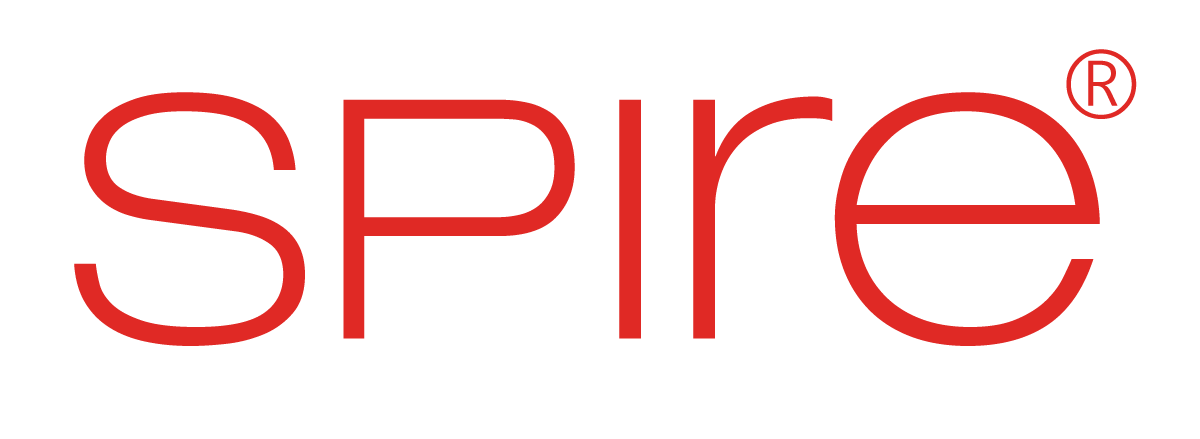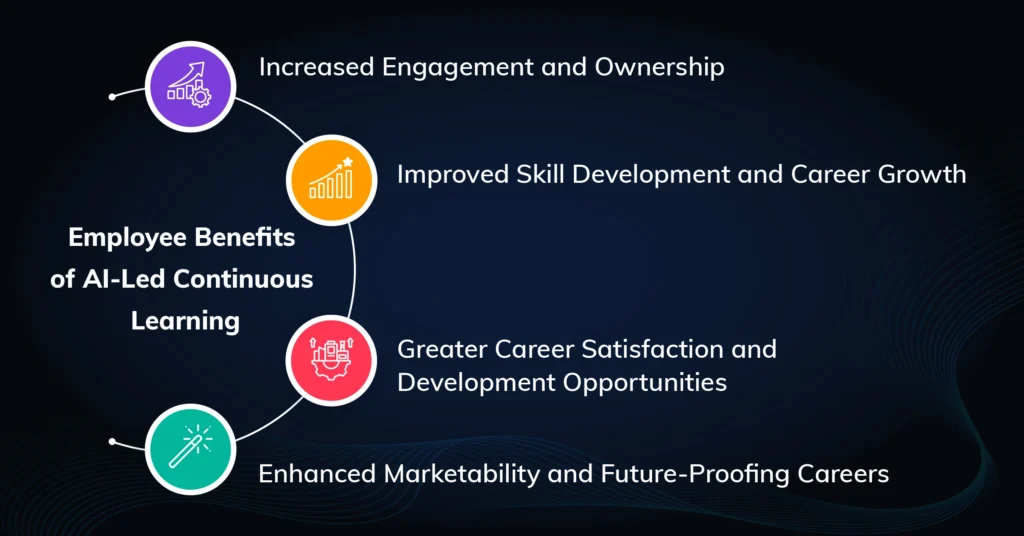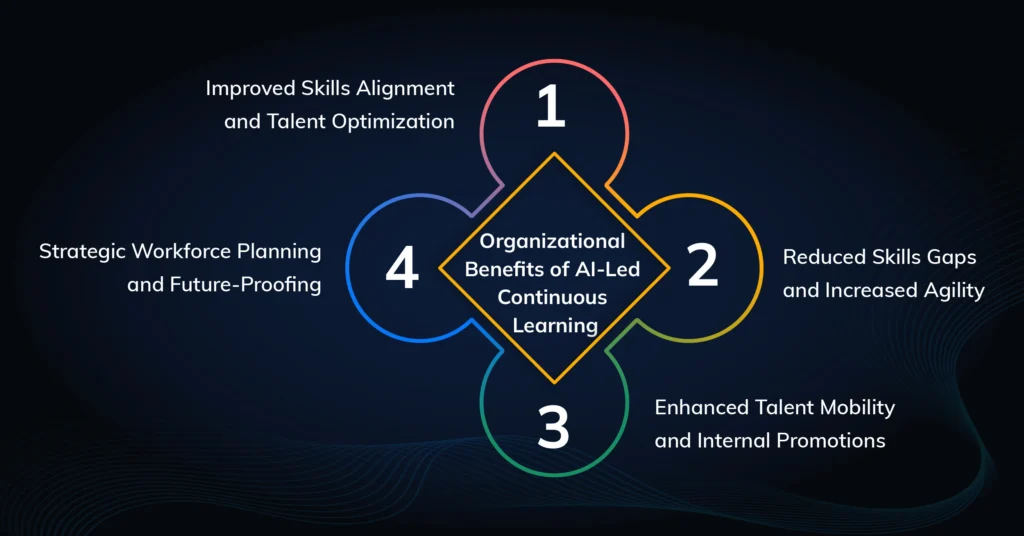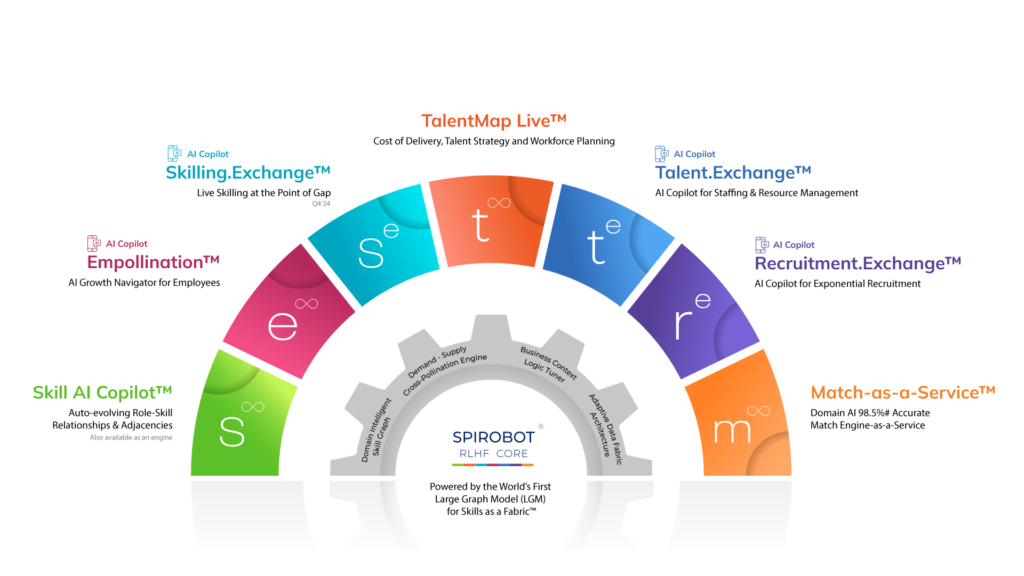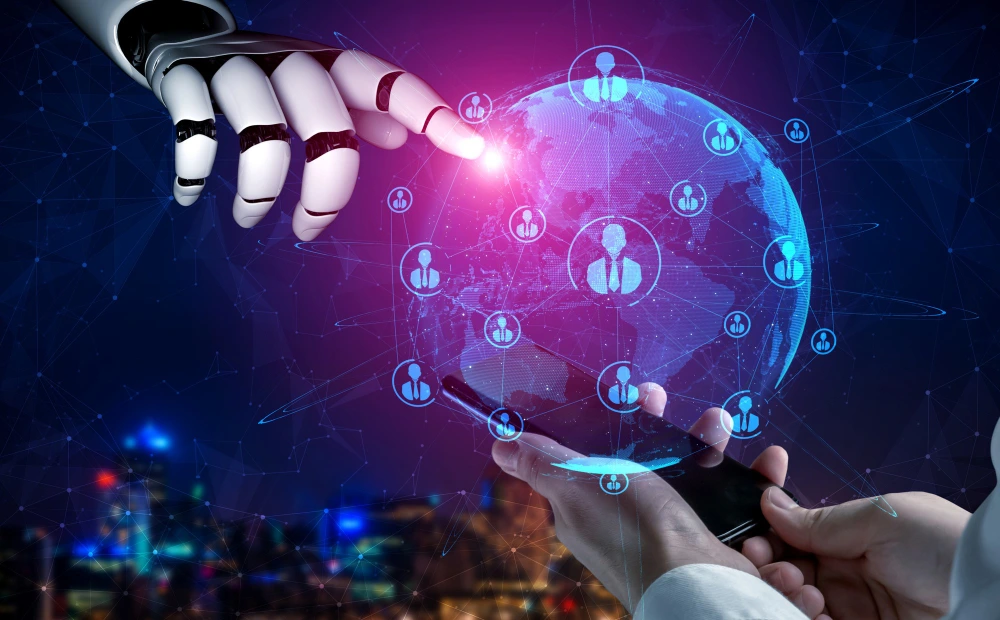The modern workplace is a dynamic and ever-changing environment. New technologies emerge, industries redefine themselves, and the skills needed for success are constantly in flux. This rapid change poses a challenge for both employees and organizations. Employees must be adaptable and willing to learn new things to stay relevant. At the same time, companies need help to equip their workforce with the necessary skills to thrive in this dynamic environment.
This is where the concept of a culture of learning comes in. A culture of learning is about more than just providing employees with training programs. It’s about fostering an environment where continuous learning is valued, encouraged, and supported. It’s about empowering employees to take ownership of their careers and actively pursue professional development.
Artificial Intelligence (AI) is a game-changer in learning and development. By harnessing AI-powered tools, organizations can create a personalized and data-driven approach to education. This empowers employees to take charge of their career journeys and opens up new possibilities for more effective and efficient learning.
The traditional focus on job titles gives way to a seismic shift in talent management: the rise of the skills-based workforce. Companies increasingly recognize that what truly matters is individuals’ specific skills rather than their positions. This shift necessitates a deeper understanding of employee skills and the ability to identify gaps that need to be filled.
The Rise of the Skills-Based Workforce
There are several key drivers behind the rise of the skills-based workforce:
Automation and Technological Disruption
Automation rapidly transforms industries, rendering specific skills obsolete and creating a demand for entirely new skills. Companies need a workforce that can adapt to these changes and continuously learn new skills.
The Gig Economy and Project-Based Work
The traditional model of long-term employment with a single company is becoming less prevalent. The rise of the gig economy and project-based work requires a flexible workforce with diverse skill sets that can be applied across different projects and contexts.
The War for Talent
In today’s competitive job market, attracting and retaining top talent requires more than just offering a good salary and benefits. Candidates increasingly seek opportunities to learn, grow, and develop their skills. Organizations with a strong learning culture and commitment to employee development are better positioned to attract and retain top talent.
The Evolving Nature of Work
The boundaries between different roles are becoming increasingly blurred. Employees are often expected to wear multiple hats and possess a broader range of skills than ever before. A skills-based approach allows companies to identify individuals with the right skills, regardless of their traditional job titles.
The Skills Gap Challenge
One of the biggest challenges associated with the rise of the skills-based workforce is the skills gap. Many organizations are struggling to keep pace with the changing skills landscape and find themselves with a workforce that needs more skills to succeed in the future.
Here’s where AI comes in. AI-powered talent management platforms can help organizations address the skills gap challenge in several ways:
- Skills Identification and Mapping: AI can analyze vast amounts of data to identify the skills required for different organizational roles. This allows companies to create a skills taxonomy and map employee skills against those requirements.
- Skills Gap Analysis: Once employee skills are mapped, AI can identify skill gaps and areas employees need to upskill or reskill. This allows for targeted training and development interventions.
- Predictive Skills Modeling: AI can predict future skill needs based on the organization’s growth plans and industry trends. This allows companies to proactively develop their workforce and ensure they have the right skills to meet future challenges.
By embracing a skills-based approach and leveraging AI-powered tools, organizations can build a future-ready workforce that is adaptable, innovative, and ready to thrive in the ever-changing world of work.
AI-Powered Skills Profiles: A Foundation for Personalized Learning
Here’s where AI shines. AI-powered talent management platforms, like Spire.AI, can revolutionize how skills are identified and tracked. Spire.AI utilizes its LGM-powered auto-evolving role-skill framework to analyze vast amounts of data from various sources, including resumes, performance reviews, and internal documents. This allows for the automatic generation of comprehensive skill profiles for a significant portion (more than 83%) of the workforce, even with minimal input such as job titles. These profiles provide a clear picture of employee strengths, areas for improvement, and potential skill gaps.
Empowering Employees with Personalized Career Development
Once a strong foundation of skill profiles is established, AI can personalize the learning experience for each employee. Advanced AI algorithms can analyze individual skill sets, career aspirations, and the organization’s overall goals. This allows for generating highly personalized career path simulations and reskilling recommendations.
Advanced AI algorithms can analyze individual skill sets, career aspirations, and the organization’s overall goals.
This allows for the generation of highly personalized career path simulations and reskilling recommendations.
Employees can leverage these recommendations to identify the skills needed for their desired career paths, whether vertical growth within their current domain or a lateral move to a different department. This empowers them to take ownership of their development and proactively pursue learning opportunities that align with their personal and professional aspirations.
Benefits of AI-Led Continuous Learning
The advantages of a data-driven, AI-powered approach to learning and development are far-reaching, creating a win-win situation for employees and organizations.
Employee Benefits
Increased Engagement and Ownership: When employees feel empowered to chart their career paths through personalized learning recommendations, their engagement levels rise. They become more invested in their development and take ownership of their careers. Personalized learning opportunities cater to individual interests and goals, leading to a more motivated and productive workforce.
Improved Skill Development and Career Growth: AI-powered skills profiles and personalized learning pathways ensure employees are focused on acquiring the most relevant skills for their desired career paths. This targeted approach optimizes training efforts and ensures employees develop their skill sets constantly, making them more valuable assets in the long run.
Greater Career Satisfaction and Development Opportunities: A continuous learning culture fosters growth and development. Employees who feel their skills are valued and have access to opportunities to learn and grow are more likely to be satisfied with their careers and stay with the organization.
Enhanced Marketability and Future-Proofing Careers: In today’s dynamic job market, having a diverse and up-to-date skillset is crucial. By providing employees with access to learning and development resources, organizations are helping them future-proof their careers and remain competitive in the long run.
Organizational Benefits
Improved Skills Alignment and Talent Optimization: AI-powered skill insights enable organizations to identify and leverage the full potential of their existing workforce. By mapping employee skills to business needs, organizations can ensure they have the right talent in the right place and time. This leads to a more efficient and productive workforce.
Reduced Skills Gaps and Increased Agility: Precise identification of skill gaps through AI analysis ensures resources are directed towards areas that yield the most significant impact. This targeted approach optimizes training efforts and closes skill gaps more effectively, allowing organizations to adapt to changing market demands and remain agile in the face of disruption.
Enhanced Talent Mobility and Internal Promotions: AI-powered skills profiles unlock internal talent mobility. By identifying employees with the right skill sets, organizations can fill open positions internally, fostering a culture of career progression and reducing reliance on external hiring. This saves time and money associated with recruitment and leads to a more engaged and loyal workforce.
Strategic Workforce Planning and Future-Proofing: AI-powered insights can predict future skill needs based on growth plans and industry trends, enabling organizations to develop their workforce to meet those needs proactively. This strategic approach ensures they have a future-ready workforce with the skills to navigate an ever-changing business landscape.
By leveraging AI-powered tools and fostering a culture of continuous learning, organizations can create a win-win situation: employees equipped with the skills needed to thrive and organizations with a future-ready workforce that is adaptable, innovative, and ready to succeed in the ever-changing world of work.
Spire.AI: Personalized Learning at Your Fingertips
Spire.AI is a leading talent management platform that utilizes AI to empower employees and revolutionize how organizations approach learning and development. Spire’s AI capabilities go beyond just identifying skill gaps. The platform leverages vast data to generate comprehensive employee skill profiles and curate personalized learning pathways for each employee.
Spire.AI leverages vast data to generate comprehensive employee skill profiles and curate personalized learning pathways for each employee.
Imagine an employee aspiring to move from a marketing role to a product management position. Spire.AI would analyze their existing skill set, identify the specific skills needed for product management, and recommend relevant learning resources, such as online courses, mentorship programs, and internal knowledge-sharing sessions. This personalized approach ensures employees develop the right skills to achieve their career goals.
By partnering with AI solutions like Spire.AI, organizations can create a dynamic and empowering learning environment where employees take ownership of their careers and continuously develop their skill sets. This is the foundation for building a future-ready workforce that can navigate the ever-evolving work landscape and propel the organization toward success.
Conclusion: Building a Future-Ready Workforce with AI and Continuous Learning
The future of work belongs to organizations that can adapt, innovate, and leverage the full potential of their human capital. By embracing a culture of continuous learning and harnessing the power of AI-powered talent management tools, organizations can empower their employees to take ownership of their careers and develop the critical skills needed to thrive in a dynamic and ever-evolving world.
This future-ready workforce will be the critical driver of success, enabling organizations to stay ahead of the curve, navigate disruption, and achieve their strategic goals. The journey towards a culture of continuous learning requires a multi-pronged approach:
- Investing in AI-powered Talent Management Tools: AI can illuminate employee skill sets, identify skill gaps, and personalize learning pathways. However, AI is just one piece of the puzzle.
- Fostering a Learning Mindset: Cultivate a culture that values continuous learning and encourages employees to embrace challenges as opportunities for growth.
- Providing Ongoing Learning Opportunities: Go beyond traditional training programs. Offer diverse learning resources, including microlearning modules, online courses, mentorship programs, and knowledge-sharing opportunities.
- Encouraging Knowledge Sharing and Collaboration: Break down silos and foster collaboration across teams. Encourage employees to share their expertise and learn from each other.
- Recognizing and Rewarding Learning: Celebrate achievements and milestones in employee learning journeys. Offer recognition programs that acknowledge and reward employees who actively pursue learning and development.
Building a culture of continuous learning is an ongoing process, but the rewards are substantial. By empowering employees to take ownership of their careers and fostering a growth mindset within the organization, companies can unlock a competitive advantage in the ever-changing world of work.
The Future of Work: A Partnership Between Humans and AI
The rise of AI in talent management doesn’t signify the end of human involvement. AI is a powerful tool to augment human capabilities, not replace them. HR professionals and managers will continue to play a critical role in:
- Designing Personalized Learning Experiences: While AI can generate recommendations, human expertise is crucial for tailoring learning experiences to individual needs and preferences.
- Providing Coaching and Mentorship: AI cannot replicate the human touch and guidance experienced mentors and coaches offer.
- Building Relationships and Fostering Engagement: Creating a learning culture goes beyond technology. Leaders need to foster a sense of community and belonging within the organization.
By embracing a human-centered approach to AI-powered learning, organizations can empower employees to participate actively in their development journeys. This collaborative approach will pave the way for a future-ready workforce that thrives on continuous learning, innovation, and success.
